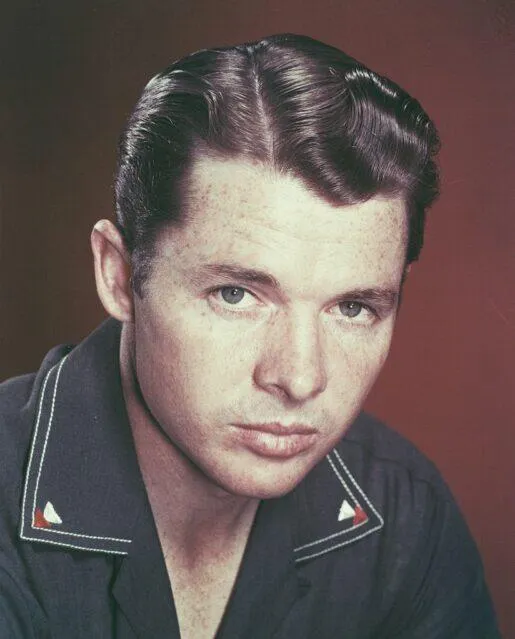Audie Murphy, a name synonymous with heroism, stands out for his incredible feats both on the battlefield and the silver screen. Rising to fame as one of the most decorated American soldiers during World War II, Murphy’s transition to Hollywood further solidified his place in history. His life, filled with daring acts of bravery and a successful movie career, is a compelling story of persistence, courage, and determination.
Here are nine intriguing and lesser-known facts about this remarkable war hero and actor.
Turned Away by the Navy and Marines

In the aftermath of Pearl Harbor, Audie Murphy was eager to join the U.S. military. Despite his enthusiasm, Murphy faced hurdles—he was rejected from the Navy, Marine Corps, and Army for being too young and underweight. But Murphy wasn’t easily discouraged.
In a clever move, he sought help from his sister to alter his birth certificate to make him appear older. With these falsified documents, Murphy made another attempt and was finally accepted into the U.S. Army, marking the beginning of his legendary military career. His determination and resourcefulness were early indicators of the courage he would later display in battle.
A One-Man Defense Against German Troops

Audie Murphy’s military service reached its peak when he performed one of the most daring acts in World War II, earning him the Medal of Honor. In early 1945, in the Colmar Pocket in France, Murphy and his men faced a formidable German counterattack.
When his comrades were forced to retreat, Murphy refused to leave. Climbing onto a burning tank destroyer, armed with just a machine gun and a radio, he single-handedly fought off waves of German soldiers. He held his ground for over an hour, ultimately inflicting heavy casualties on the enemy. Despite being injured, Murphy returned to his unit to lead a counterattack, saving countless lives. Reflecting on his bravery, Pvt. Charles Owen said, “He saved our lives. If he hadn’t done what he did, the Germans would have annihilated us.”
Reclaiming His First Name

As a child, Murphy disliked his given name, “Audie.” He preferred using his middle name, Leon, which was given to him by his older sister. However, after joining the Army, Murphy began to embrace his first name. His comrades found “Leon” too rustic, and soon he became known as “Audie” or “Murph” for the rest of his life—a name that would later become legendary.
The Most Decorated Soldier in U.S. History

Murphy’s list of accolades is nothing short of remarkable. He was awarded every U.S. military combat honor for valor, including the prestigious Medal of Honor. His other awards include the Distinguished Service Cross, the Silver Star, and the Bronze Star, among many others.
In addition to these American honors, Murphy also received several international decorations. Both the French and Belgian governments awarded him their highest honors, including the French Legion of Honor and the Belgian Croix de Guerre. This array of medals highlights not only his bravery but also the respect he earned from nations around the world.
A Lifelong Battle with PTSD

After the war, Audie Murphy’s struggles didn’t end on the battlefield. Like many veterans, he suffered from what was then called “battle fatigue,” now recognized as post-traumatic stress disorder (PTSD). He experienced insomnia, depression, and a range of emotional challenges.
Murphy sought medical help and was prescribed a strong sedative, which led to addiction. Realizing the danger of the medication, he checked into a motel to detox by himself. Murphy later became an outspoken advocate for mental health, urging the government to invest in research on the psychological effects of war.
Audie Murphy’s Hollywood Aspirations

At one point, Audie Murphy hoped to produce a movie about fellow Medal of Honor recipient, Desmond Doss. Doss had heroically saved the lives of 75 men during the Battle of Okinawa. However, Doss turned down Murphy’s offer, insisting that he didn’t want “his character being impugned or compromised.” It wasn’t until decades later, in 2016, that Doss’s story would finally be told in the acclaimed film, *Hacksaw Ridge*.
Starring as Himself

It’s rare for anyone to star in a movie about their own life, but Audie Murphy did just that. In 1955, he portrayed himself in *To Hell and Back*, a film based on his World War II experiences. The movie, which premiered on the anniversary of his Army discharge, was a box office success and remains one of the most accurate depictions of wartime heroism.
Principles Over Profit

Despite facing financial difficulties later in life, Murphy held firm to his principles. He lost significant sums of money in a failed oil venture and struggled with IRS tax debts. Still, when offered lucrative deals to promote cigarettes and alcohol, he refused. Murphy felt a deep responsibility to his young fans and was determined to set a positive example for them, even if it meant turning down much-needed income.
A Final Resting Place Among Heroes

On May 28, 1971, Audie Murphy tragically died in a plane crash in Virginia. He was buried with full military honors at Arlington National Cemetery. His grave became one of the most visited, second only to President John F. Kennedy’s, a testament to his enduring legacy as both a soldier and a star.
Audie Murphy’s life is a testament to the resilience of the human spirit. His journey from a poor Texas farm boy to one of the most celebrated figures in American history continues to inspire generations.



